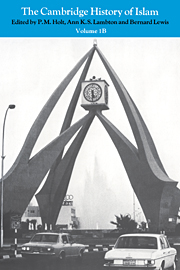Book contents
- Frontmatter
- Introduction
- Part IV The central Islamic lands in recent times
- 1 Modern Turkey
- 2 The Arab lands
- 3 Modern Persia
- 4 Islam in the Soviet Union
- 5 Communism in the central Islamic lands
- 6 The Political impact of the West
- 7 Economic and social change
- Dynastic lists
- Bibliography
- Glossary
- Index
- References
5 - Communism in the central Islamic lands
from Part IV - The central Islamic lands in recent times
Published online by Cambridge University Press: 28 March 2008
- Frontmatter
- Introduction
- Part IV The central Islamic lands in recent times
- 1 Modern Turkey
- 2 The Arab lands
- 3 Modern Persia
- 4 Islam in the Soviet Union
- 5 Communism in the central Islamic lands
- 6 The Political impact of the West
- 7 Economic and social change
- Dynastic lists
- Bibliography
- Glossary
- Index
- References
Summary
Before 1917
The period of radical reform at the end of the nineteenth and the beginning of the twentieth century was one in which all revolutionary energy was mobilized in the upsurge of the nationalist movement. It was in the wake of this movement that Marxist ideas began warily to make their way into the Muslim world. For a long time, until the Russian Revolution of 1917, socialism could only show itself as the extreme left wing of the nationalist movement.
There are two basic reasons for this slowness in the spread of Marxist ideas: the indifference of the first leaders of European socialism to the dār al-Islām' and the lack of receptivity to socialism offered by Muslim society as a whole.
Marxist socialism, a complex system of economic, political and philosophical doctrines, originally conceived for the industrial societies of the West, was thought to be applicable, sooner or later, to the whole world. The ideas of the founders of socialism and their successors until 1914 were, with some considerable variations in their positions, centred on Europe and the West. The Muslim East interested them only in so far as it affected their international policy. It offered no objective reasons for supposing that socialist proselytization would have much chance of success there. They regarded it as a marginal problem, dependent on the general problem of the proletarian revolution in the West. They applied to it theses designed to apply to Europe, and predicted for it the same revolutions, passage through the same economic and social ‘patterns’, and the same crises as the West.
- Type
- Chapter
- Information
- The Cambridge History of Islam , pp. 644 - 672Publisher: Cambridge University PressPrint publication year: 1977

